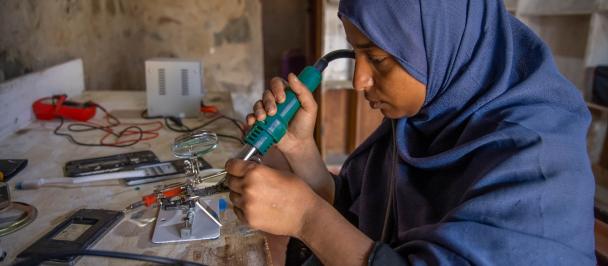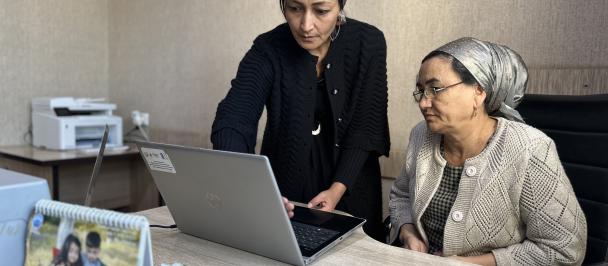Author: Rimma Mukhtarova
Public advisory councils as a link between civil society and the government
February 16, 2024
a hemodialysis patient receiving treatment
“I have been receiving hemodialysis for over 5 years. Previously, for this I had to travel from Kasansay to Namangan 3 times a week, which took almost the whole day and a certain amount. Now I receive hemodialysis free of charge in my district and I don’t need to travel anywhere,” Muhabbat opa, who is being treated at the Kasansay district hospital, tells us. It is important for patients like her to receive dialysis regularly because it is essentially a kidney replacement. If hemodialysis is not done, kidney failure can be fatal.
a hemodialysis patient receiving treatment
Bakhriddin, Afghan war, in which he was veteran wounded in the kidney, shares with us “I have been struggling with my illness for 35 years. He underwent treatment in various cities of both the former Union and Uzbekistan. The most difficult time for me was during quarantine (COVID19), since it was impossible to go to Namangan to receive hemodialysis. Now there is no need to go anywhere thanks to the new Center in our district.”
For patients in need of hemodialysis, such as Bakhriddin and Muhabbat opa, more convenient conditions have been created to receive the treatment necessary for their lives thanks to the optimized and expanded work of the Hemodialysis Center at the district hospital in the Kasansay district of the Namangan region.
Previously, the hemodialysis department of the district hospital was equipped with three machines, one of which was purchased from sponsors and two were provided by the government, but they were not fully used due to the lack of a special department and medical staff. One dialysis machine could only serve 8–9 patients and was used only 3–4 times a day, since one hemodialysis procedure takes four hours and is carried out 3 times a week.
Faced with this problem in the Kasansay district of the Hemodialysis Department, a resident of the district, whose son needed constant hemodialysis, submitted a request to the Public Advisory Council (PAC) with a proposal for optimization.
What is the Public Advisory Council?
Public councils are an institution of civil participation that ensures rational discussion when making decisions in modern society, and are specifically created for the purpose of developing recommendations to authorities and officials. Public councils, created by the state or local communities, exist in various forms in almost every country in the world and are an effective mechanism for providing information to the public, assisting in the development of legislation, the state budget, contributing to the decentralization of the public administration system and monitoring the implementation of government decisions, and most importantly - ensuring active participation of citizens in decision-making.
Based on best international practice and recommendations of analytical materials prepared within the framework of the Joint project of the Ministry of Justice, the European Union and UNDP in Uzbekistan “Improved Public Service Delivery and Enhanced Governance in Rural Uzbekistan”, in four pilot districts under the Kengashes of People’s Deputies (Kasansay, Shurchi, Bakhmal and Khavast districts) created Public Advisory Councils to develop recommendations on the most problematic social and everyday issues of concern to the public living in this territory.
The Public Advisory Council includes reputable citizens with extensive practical experience in sectors of public activity, representatives of non-governmental non-profit organizations and the media, independent experts, representatives of faiths, public organizations, honored figures of science, culture and sports, in particular, people who care to the problems of the population, who are ready and not afraid to raise issues of pressing problems of the local population or even the region. All members of the Public Advisory Council carry out their activities on a voluntary basis.
Often, PAC members are well informed about the needs of the community, which allows them to analyze the basic needs of the community, explore ways to solve problems, involve the community in solving social problems, and actively discuss pressing issues that affect the interests of the community.
Today, the activities of the Public Advisory Council include public control through public monitoring, public examination, the study of public opinion, discussion in the media and public hearings. This has made it possible to achieve some tangible results already during 2021-2023.
Hemodialysis center
One of the successful results of the work of the Public Advisory Council is the Hemodialysis Center we mentioned at the district hospital in the Kasansay district of the Namangan region.
Based on the request, the Council analyzed the situation on site and found that special rooms and medical staff were required to ensure uninterrupted use of the machines. First of all, the issue of opening the Center was submitted for consideration to the local Kengash of People's Deputies, as a result of which approval was received and the proposal was sent to the Oliy Majlis of the Republic of Uzbekistan. After consideration and approval by the Oliy Majlis, the request to create the Department was sent to the Ministry of Health. As a result, on the initiative of the Public Advisory Council, the Hemodialysis Department was created and a staff of 28 medical personnel was opened
At the moment, 36 patients (12 women and 24 men), including from the neighboring district (32 from Kasansay and 4 from Yangikurgan districts), can receive hemodialysis services. Previously, all patients had to travel to the regional hospital in Namangan, which took a lot of time and additional travel expenses.
a doctor checking on a hemodialysis patient
Dr. Farkhod Jabborov, head of the Dialysis Center: “Also, with the support of the Public Advisory Council, additional staff members were created to ensure the uninterrupted operation of this Center: doctors, nurses, orderlies, etc. The center operates 7 days a week and all procedures are performed absolutely free. People with chronic renal failure can and should live full lives!”
Public advisory councils must be responsive to the demands of civil society to participate as an important connecting tool between civil society and the government.
It should be noted that the next step, with the assistance and support of the Public Advisory Council, is planned to create a nephrology department to identify and treat kidney diseases, as well as organize free meals for all patients of the Dialysis Center, since the cleansing procedure takes about 4 hours.
Foreign experience shows that improving the foundations of local democracy, ensuring and strengthening the participation of the population in government activities is not only a task from above, but is becoming one of the basic principles of the local government system.
In their activities, PACs concentrate on identifying existing shortcomings in the social and public life of the region, thereby ensuring an appropriate response to the growing demands of society, solving accumulated local problems, rapid development of the economy and, as a result, achieving the expected positive changes in people’s lives.

 Locations
Locations



